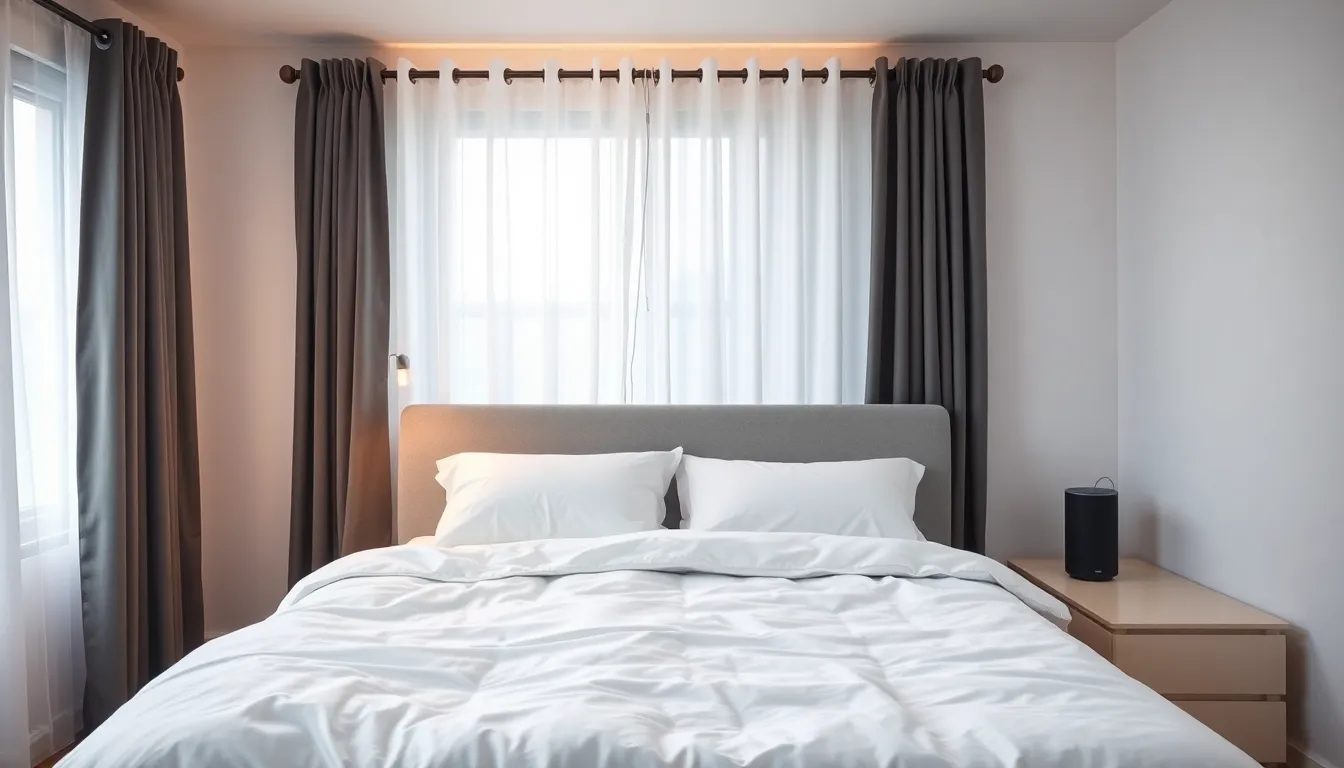Quality sleep isn’t just a luxury; it’s a necessity. Imagine waking up feeling like a superhero instead of a zombie who’s just survived a night of wrestling with their pillow. With the right sleep habits, anyone can transform their nights from restless tossing and turning into peaceful slumber that leaves them refreshed and ready to conquer the day.
Table of Contents
ToggleImportance Of Quality Sleep
Quality sleep significantly impacts physical and mental health. It affects mood regulation, cognitive function, and overall productivity. Poor sleep can lead to health issues, including obesity, diabetes, and cardiovascular diseases. Studies show that adults require 7 to 9 hours of sleep each night for optimal functioning.
Adequate sleep enhances memory consolidation and information retention. When individuals sleep well, their brains process and store memories, making learning more effective. Sleep deprivation hampers problem-solving skills and creativity. People who prioritize quality sleep often find improved focus and concentration.
Mental health also benefits from quality sleep. Sleep disorders contribute to anxiety and depression. When rest is prioritized, individuals experience lower stress levels and better emotional stability. Research indicates that consistent sleep patterns can reduce the risk of developing mental health conditions.
Physical performance improves with better sleep as well. Athletes who sleep adequately exhibit enhanced reaction times and endurance. Quality rest aids in muscle recovery and repair, promoting overall fitness. Those engaging in regular physical activity find that sleep impacts workout performance.
Implementing sleep hygiene practices can foster better sleep quality. Techniques such as maintaining a consistent sleep schedule and creating a relaxing bedtime routine can improve sleep habits. Limiting screen time before bed also helps promote restful sleep. By focusing on these strategies, individuals can experience the myriad benefits of quality sleep.
Factors Influencing Quality Sleep

Quality sleep depends on several interrelated factors that contribute to an individual’s overall sleep experience.
Sleep Environment
Sleep environment plays a crucial role in quality sleep. A dark, quiet, and cool room enhances sleep conditions. Quality bedding can also significantly impact comfort during sleep. Incorporating blackout curtains, sound machines, or air purifiers can create an optimal atmosphere. Individuals often find that removing distractions like electronic devices promotes deeper rest. Personal preferences around mattress firmness and pillow types also influence overall sleep quality.
Lifestyle Habits
Lifestyle habits directly affect sleep quality. Regular exercise boosts sleep efficiency and decreases insomnia symptoms. Maintaining a consistent sleep schedule reinforces the body’s natural circadian rhythm. Nutrition choices also matter; avoiding large meals and caffeine close to bedtime aids in promoting uninterrupted sleep. Aiming for 7 to 9 hours of nightly sleep is essential for optimal functioning. Mindful habits such as reading or meditating before bed can enhance relaxation.
Stress Management
Stress management techniques significantly improve sleep quality. Practices like deep breathing and mindfulness reduce tension and prepare the body for rest. Regular engagement in stress-relieving activities, such as yoga or journaling, may promote better sleep. Individuals who prioritize their mental well-being often experience fewer sleep disturbances. Implementing effective time management strategies can further alleviate stress, creating a more peaceful night’s rest.
Benefits Of Quality Sleep
Quality sleep offers significant benefits across various aspects of life, enhancing both physical health and mental well-being.
Physical Health
Quality sleep directly impacts physical health by supporting essential bodily functions. When individuals experience adequate rest, their immune system strengthens, reducing illness risk. Staying asleep for the recommended 7 to 9 hours allows the body to repair itself, resulting in muscle recovery and hormone regulation. Furthermore, good sleep contributes to maintaining a healthy weight, as sleep deprivation can disrupt metabolic processes. Poor rest increases hunger hormone levels, leading to overeating. Cardiovascular health also benefits from quality sleep, with studies linking insufficient sleep to higher risks of heart disease. Prioritizing restful sleep ultimately supports overall physical health.
Mental Well-Being
The mental well-being benefits of quality sleep are crucial for daily functioning. Sleep plays a vital role in memory consolidation, allowing information to be processed and stored effectively. By maintaining a consistent sleep routine, cognitive function improves, facilitating better decision-making and problem-solving. Emotional regulation is also enhanced, as adequate sleep helps stabilize mood and reduce stress levels. Better rest correlates with decreased anxiety and depression, promoting a more positive outlook on life. Prioritizing sleep not only nurtures mental clarity but also fosters emotional resilience in challenging situations.
Tips For Improving Quality Sleep
Improving quality sleep involves adopting effective practices and techniques. The following sections provide specific strategies that enhance restfulness.
Sleep Hygiene Practices
Establishing a consistent sleep routine plays a vital role in improving sleep quality. Setting a regular bedtime and wake-up time fosters a natural sleep-wake cycle. Creating a conducive sleep environment makes a noticeable difference; a dark, quiet, and cool bedroom promotes relaxation. Limiting screen time an hour before sleep reduces exposure to blue light, which can interfere with falling asleep. Avoiding caffeine and heavy meals in the evening prevents disruptions during the night. Engaging in calming activities, such as reading or gentle stretching, can help shift the mind toward rest. These practices collectively promote a more restorative sleep experience.
Relaxation Techniques
Incorporating relaxation techniques into nightly routines helps ease the mind and body. Deep breathing exercises can slow the heart rate and promote relaxation. Progressive muscle relaxation encourages awareness of tension, allowing individuals to release stress throughout the body. Mindfulness meditation focuses attention and fosters a calm state of mind, making it easier to transition to sleep. Additionally, creating a calming pre-sleep ritual, such as taking a warm bath or listening to soothing music, signals the body it’s time to wind down. Regular practice of these techniques enhances the ability to fall asleep effortlessly.
Quality sleep is essential for maintaining both physical and mental health. By prioritizing rest and adopting effective sleep habits, individuals can experience significant improvements in their overall well-being. A consistent sleep routine and a conducive sleep environment play critical roles in achieving restorative sleep.
Incorporating relaxation techniques can further enhance the ability to unwind and transition into sleep. As individuals commit to these practices, they’ll likely notice increased energy levels, better mood regulation, and enhanced cognitive function. Quality sleep isn’t just a luxury; it’s a vital component of a healthy lifestyle that empowers individuals to thrive in their daily lives.



